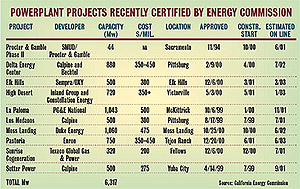As california acts to calm the power market that has sent rolling blackouts across the state and shock waves across the country, the program taking shape promises to involve the state deeply in the power industry for years to come. But the rescue program, which so far includes ambitious conservation measures and long-term contracts for bond-backed power purchases, may have little effect on what many observers are calling the fundamental problem--generation-capacity shortages.
 |
A special meeting of the Western Governors' Association Feb. 1-2 in Portland, Ore., on the regional impacts of California's power shortage produced unanimous agreement on 13 short-term remedies. They range from encouraging California and its generators to enter into long-term contracts to requesting President Bush's interagency energy task force to help streamline the process to reactivate retired plants and get new generation on the grid. The governors also agreed to develop long-term policies to streamline processes for siting new generation, electrical transmission and natural gas pipelines, accelerate development of renewable energy technologies and explore and develop oil, gas, coal and wind resources.
But calls for price controls made no headway. Noting that the association is divided on whether to cap power prices, Idaho Gov. Dirk Kempthorne (R), wga's chairman, said the group must have unanimous consent to move forward. Kempthorne and the governors of Alaska and Colorado are among those opposed to a price cap, sources said. New U.S. Energy Secretary Spencer Abraham refused to impose controls, saying he had concerns that a price cap might create disincentives in the marketplace.
 |
Just before leaving for the wga conference Feb. 1, California Gov. Gray Davis (D) signed into law a program to calm electricity-price volatility by authorizing the state Dept. of Water Resources to nail down long-term contracts with generators. State officials are betting on the move to drive down prices by moving away from expensive purchases on the spot market.
That legislation, passed under intense pressure from Davis, shielded the governor from what could have been a confrontation at the conference. Davis told the governors his state is addressing its problems in a special session of the legislature and said he had signed an $800-million conservation bill that is expected to give incentives to save 3,700 Mw.
Davis further said the state is "moving at warp speed to put powerplants online." So far, nine plants have been licensed and 14 are in the process of being permitted, he said. The state is trimming the time to permit plants from 12 to six months to even three months in some cases in an effort to have 2,000 Mw of new capacity online by summer, he said. "Every single application that the [California] Energy Commission has received has been approved."
But questions persist as to whether it will be enough. The state's theoretical capacity of 48,000 Mw has been barely able to meet peak demand of about 31,000 Mw this winter, and rolling blackouts have occurred almost daily (ENR 1/29 p. 10). According to the California Energy Commission, only 1,364 Mw will be added by this September, with 1,043 more coming on line in November (see table p. 13). The commission estimates average 2005 demand of 33,500 Mw, but the peak could be substantially higher. Now in the pipeline, in addition to this year's gains, is a total of 3,910 Mw more. The commission is expecting applications for 6,626 Mw more, but there are no assurances about them
Washington's response remains the wild card in the game. A Jan. 31 Senate Energy and Natural Resources Committee hearing on the crisis showed that there's no Capitol Hill consensus on what the federal role should be in finding a remedy to California's troubles. But it also demonstrated that there's general agreement the problem is spreading. Committee Chairman Frank Murkowski (R-Alaska) said, "California's problems are affecting everyone connected to the grid--the entire West, and I fear that the worst is yet to come."
 |
Federal Energy Regulatory Commission Chairman Curt Hebert, a Republican, disparages price caps, saying they give consumers no incentive to conserve. But Democratic ferc commissioners don't share his view. Commissioner Linda Breathitt told the WGA conference she was willing to "look at all options" and Commissioner William Massey said he wanted to "disassociate" himself from Hebert's findings. "FERC must take a more aggressive role. A hands-off approach is both unlawful and politically unacceptable," Massey said.

Post a comment to this article
Report Abusive Comment